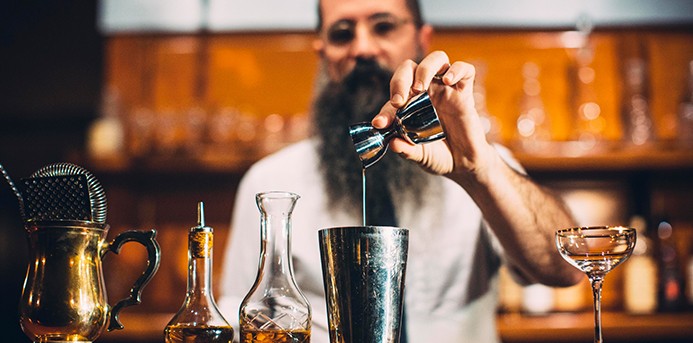Bars were once mostly places you’d roll into and order a drink that would usually come from a bottle or a tap. Your drinks would be served by a guy who, though he was personable and willing to wipe off the counter for you, probably didn’t know how to make more than a handful of classic cocktails, built from standard ingredients.
Then, everything changed. Bars became something more, serving unique signature cocktails made with exotic ingredients and arcane spirits. It’s been fascinating to see how bars have evolved together, with one bar influencing another, raising the level of play for watering holes throughout the city.
In Chicago, that evolutionary process of redefining the bar seems to have started at one place…
The Violet Hour
1520 N. Damen, Chicago, 773-252-1500
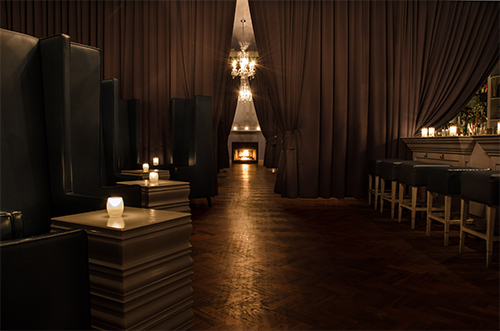
For many of us, the pivotal moment in the evolution of the Chicago bar was around 10 years ago, when The Violet Hour launched a process of redefining what a bar could — and perhaps should — be. The Violet Hour didn’t break the traditional rules of the barroom — it evolved beyond them. Here, bartenders not only had an encyclopedic knowledge of the drinks they made, but they also knew every ingredient that went into that drink; many times, they hand-crafted some of those ingredients — bitters, juices, tinctures and so on — themselves. The bartenders were professionals, very enthusiastic about what they were doing; they shared their excitement — and knowledge — with everyone who sat at the bar. The folks at the bar wanted to hear what the bartenders had to say; they wanted to learn about what was in their cocktail glasses.
The Violet Hour was a place where one learned about cocktails and then consumed them, thoughtfully, in an almost contemplative manner. Alcohol is delicious and comforting, but it’s also powerful. It must be respected.
The Violet Hour was special and different, and that special difference is announced in plaques in their washrooms and on their website homepage: “No cellphone use inside lounge. Proper attire requested. Please, no baseball caps. Sorry, no reservations. If you have a party of four, we’ll give you four chairs. If your party is eight, we’ll arrange eight chairs for you. No ‘party add-ons’ without prior notification. No O-bombs. No Jager-bombs. No bombs of any kind. No Budweiser. No light beer. No Grey Goose. No Cosmopolitans. And finally, please do not bring anyone to The Violet Hour that you wouldn’t bring to your mothers’ house for Sunday dinner.”
Clearly, though this cheeky mission statement may seem a touch heavy-handed, slightly ominous with indignant Old Testament-style prohibition, The Violet Hour was a game-changer. But, it had clear antecedents, like Delilah’s and The Hopleaf Bar.
Delilah’s
2771 N. Lincoln Ave., Chicago, 773-472-2771
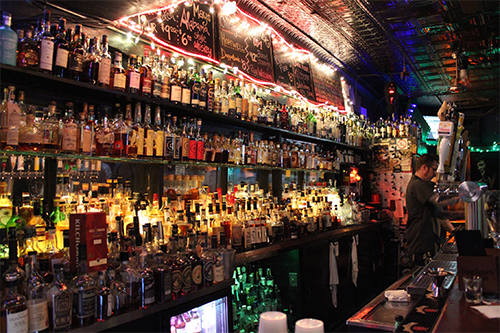
In separate conversations with the Fifty/50 Group‘s Benjamin Shiller, who manages beverage programs at places like Leviathan, Apogee, and The Sixth, as well as Kaveh Zamanian, a sometime Chicagoan and founder/CEO of Rabbit Hole Distilling, both mentioned that Delilah’s was one of several seeds from which grew places like The Violet Hour, as well as their own operations. Delilah’s was, indeed, in the vanguard of Chicago’s new style of bars, and like The Violet Hour, it was different from the very start. Unlike The Violet Hour, however, there’s a kind of dive bar vibe to Delilah’s, a retro-punk edginess. Behind the bar, there are serious cocktail enthusiasts with a decided whiskey preference (more than 700 whiskeys line the shelves). As at The Violet Hour, Delilah’s is all about educating the consumer; owner Mike Miller believes “most emerging Scotch whisky drinkers want to know what they like; and the way to find that is to come to places like Delilah’s.” It’s not just a drink; it’s an education. Delilah’s is open every day of the year, and they’ve been doing it for about a quarter-century (!).
The Hopleaf Bar
5148 N. Clark St., Chicago, 773-334-9851
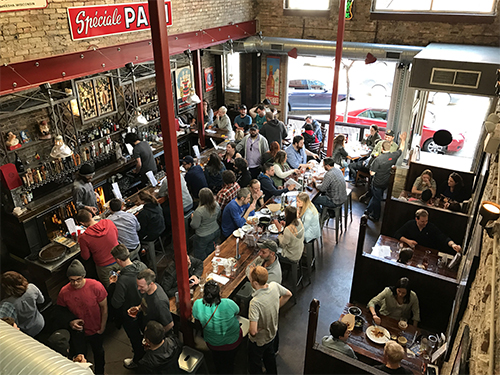
In the early Aughts, we stopped by Hopleaf and were knocked out by the selection of beers, specifically Belgian beers, many offered in their traditional glassware (which, honestly, we did not even know existed). In those days, there was no food served at Hopleaf; it was all very rough and evolving, but the beers were memorable as were the bartenders and servers, who really knew their brews and seemed eager to share that information and proselytize the virtues of obscure Belgian labels. Since then, Hopleaf has added a restaurant space and has started to serve food; this evolution from simple bar to bar/restaurant was also followed at other new bars, including The Aviary. The Hopleaf’s list of beers, some largely unavailable anywhere else in Chicago, continues to grow, frequently featuring extremely rare “one-off” selections from breweries in the U.S. and Europe. Despite all that growth, The Hopleaf Bar retains the person-to-person approach of the traditional bar; in early 2017, owner Michael Roper told The Chicago Tribune, “We’re old school … I know a lot of customers … I get invited to their weddings. We’re true publicans, operating the way taverns existed in the 17th century.” Bringing back old-timey hospitality may be a good plan, but surely no tavern in the 1600s had anywhere near The Hopleaf Bar’s selection of carefully curated beers.
The Aviary
955 W. Fulton Market, Chicago, 312-266-0868
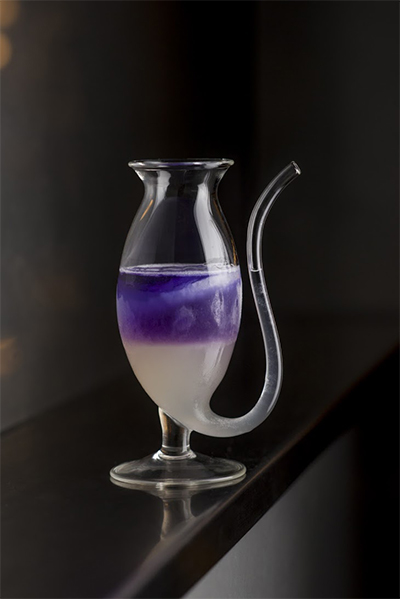
While The Hopleaf Bar may aspire to be a traditional tavern, The Aviary has always focused on becoming the bar of Now. In April of 2011, Chicago cocktailians were understandably excited to hear that a new bar was going to be guided by the genius team of Grant Achatz and Nick Kokonas of Alinea (one of only two Chicago restaurants to be granted Michelin 3-star status). That enthusiasm was justified. The Aviary delivers beautifully tuned cocktails that, like many of the menu items at Alinea, come in specially designed serving vessels, such as a large circular glass wheel containing liquors, herbs, fruits, nuts, and flowers that infuse the spirits so that flavors build over time. In addition to the hugely creative beverages, The Aviary also serves bites and snacks that reflect the imaginative energy of a “kitchen bar” staffed by bartenders who are trained as chefs. “The Aviary,” Kokonas says, “was conceived as ‘a restaurant for drinks’ and to function more like a restaurant kitchen than a bar, with service higher than in a typical bar or lounge. Once we figured out how all that works (design, experience, etc.) then we let our imaginations run wild with the drinks and food. We’ve added many more extensive experiences, including 3-, 5- and 7-course drink and food progressions that are unique to The Aviary. I personally haven’t seen any other bars offering those sorts of elevated ‘tasting menus’ for cocktails.” Downstairs of The Aviary is The Office, a VIP invitation-only space, with 14 seats, serving otherwise-impossible-to-find spirits, which has itself been an inspiration to other bartenders, like Paul McGee at Milk Room. Clearly, this is not how we thought of bars before, and it’s been working very well for the team of Achatz/Kokonas; in late September 2017, a second Aviary opened in New York’s Mandarin Oriental.
Milk Room
12 S. Michigan Ave., Chicago, 844-312-2221
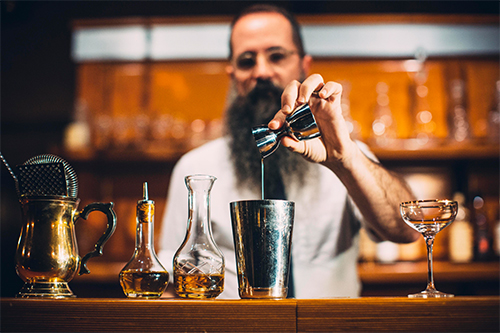
Milk Room in the Chicago Athletic Association is unlike any other bar you’ve ever visited. The space housed a small pocket bar during Prohibition, and Milk Room has only eight seats; you need reservations and to reserve a seat, you’ll have to put down a $50 deposit, which might be a first for any bar anywhere. Milk Room is where you’ll be able to enjoy cocktails made with ingredients that are likely impossible to find anywhere else in Chicago or perhaps even the world. There are spirits going back to the ’40s, ’50s and ’60s, which is fascinating for fans of Lillet, Campari, and other spirits because the recipes for those liquors have changed over time; at Milk Room, you can have some of the original versions. Warning: Some drinks are hundreds of dollars per pour, and you might want to take those rare spirits straight, or simply on ice, so that you can enjoy them in all their dimensions without other flavors contaminating their purity. Of course, you can also have them in a remarkable cocktail. Bar wizard Paul McGee tells us that “Milk Room was inspired by my visits to The Office, which offers pours of vintage spirits but doesn’t use them in cocktails. I thought it would be great to give guests the best of those two experiences: a small, intimate space with lots of individual attention, serving cocktails with rare and vintage spirits.” All this is predictably pricey: When we were there, the least expensive cocktail on the menu was a Manhattan for around $30.
Leviathan/Apogee
Leviathan: 660 N. State St., Chicago, 312-202-6055; Apogee: 2 W. Erie, Chicago, 312-202-6060
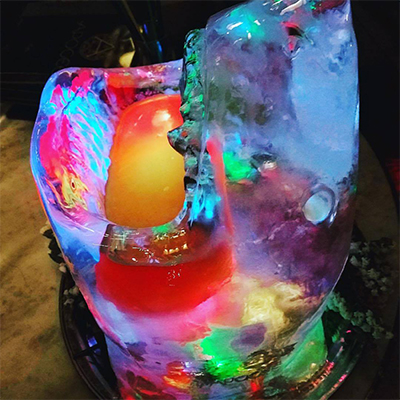
Opening just last summer, Leviathan is the bar on the balcony right above seafood-centric Portsmith restaurant. Apogee is the bar located on the roof. Both Leviathan and Apogee are at the Dana Hotel and Spa on the near north side of Chicago. Schiller manages both bars, as well as others for the Fifty/50 Group. He’s one of Chicago’s most talented bartenders, named Bartender of the Year by Eater.com and “Best Mixologist” at the Jean Banchet Awards. Both of Schiller’s bars at the Dana specialize in craft cocktails presented in sometimes outrageous serving ware, the kind you would never see in a traditional bar. At Leviathan, you can get the eponymous cocktail in a glass sheathed in gold and silver leaf that looks like fish scales, appropriate in that the bar is attached to Portsmith. At Apogee, you can get large-format cocktails served in a smoking bong, in a large ceramic toadstool … and in a shark’s head made of ice. Is it possible that Chicago bars have jumped the shark? Maybe, but it sure is fun, which is the main reason most of us go to bars; as long as the drinks are well crafted, bring on the fun.
Looking Ahead
Schiller told us he believes that “this is the most competitive time for the food and beverage industry; everyone is trying to innovate and find something that will differentiate themselves in the marketplace.”
Unlike maybe 20 years ago when a bar was a bar was a bar, you now walk into one of the bars mentioned above not quite sure what to expect. The surprises you encounter — the new beverages, environments, and presentations — are what keep us entertained, engaged, and, yes, drinking ever more crafted, complex and interesting cocktails.
Booze Brands That Give Back
If all this talk of specialty cocktails has you itching to whip up some of your own at home, pick up a bottle of one of these booze brands that give back, and help support a worthy cause while you sip.
More from Make It Better:
- 8 Must-Try Chocolate Desserts Around Chicago
- 4 Under-the-Radar Wine Vacations in North America
- 10 Ethnic Restaurants Around Chicago to Visit Right Now

David Hammond is Dining and Drinking Editor at Newcity and contributes to the Chicago Tribune and other publications. In 2004, he co-founded LTHForum.com, the 15,000 member food chat site; for several years he wrote weekly “Food Detective” columns in the Chicago Sun-Times; he writes weekly food columns for Wednesday Journal. He has written extensively about the culinary traditions of Mexico and Southeast Asia and contributed several chapters to “Street Food Around the World.”
David is a supporter of S.A.C.R.E.D., Saving Agave for Culture, Recreation, Education and Development, an organization founded by Chicagoan Lou Bankand dedicated to increasing awareness of agave distillates and ensuring that the benefits of that awareness flow to the villages of Oaxaca, Mexico. Currently, S.A.C.R.E.D is funding the development of agave farms, a library and water preservation systems for the community of Santa Catarina Minas, Oaxaca.
